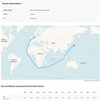New Plan to Plug Oil and Gas Skills Gaps
A new approach to tackling the need to attract thousands of new recruits into the oil and gas industry has been unveiled by sector skills body OPITO.
OPITO said it is responding to the need for a less fragmented approach to the skills issue with a £1.2million annual investment that will result in the creation of the first ever national oil and gas skills agenda.
The move will see six jobs created immediately, based within OPITO’s headquarters at Portlethen, Aberdeen, with further recruitment likely in the coming months.
“Despite significant investment largely from industry, but more recently from government, and a raft of private and public initiatives, we are still not properly addressing the skills challenges in oil and gas. It is vital that more definitive action to deliver a sustainable supply of people into the industry is taken. As the body responsible for skills, it is up to OPITO to take control and lead the charge for a step-change,” said Larraine Boorman, managing director of OPITO in the U.K.
“Valuable activities and initiatives do exist but there are so many voices speaking that it is difficult to hear the real issues and make sure that the right people are listening. A landmark shift has to happen if the industry is to break the cycle which it has been struggling to overcome for decades.
“The bedrock of that is in capturing accurate labor market intelligence to determine the real facts about the current and expected skills gaps across all industry sectors.”
OPITO is to undertake the first fully comprehensive national oil and gas skills survey, capturing factual information across all sectors of the industry. The results will be published in January 2014 and used to form the basis for a national skills strategy going forward.
“There have been numerous surveys and predictions in the last 12 months from a range of trade bodies, analysts and recruitment companies predicting anything from 10,000 to 150,000 people needed in the coming years,” Mrs. Boorman said.
“Not only do these figures fluctuate significantly, but they don’t tell us with any certainty or clarity what we really need to know, such as how many apprentices do we need each year, how much transition training is required and in which disciplines, or where we need capital investment to increase training capacity.
“Once we have accurate labor market intelligence, it will allow us to correctly inform industry, Government, education and training providers and help the industry to shape a streamlined skills strategy from which projects and initiatives will be identified, implemented and invested in.”
The U.K. oil and gas industry currently employs 440,000 people with thousands of additional workers needed to fill core offshore roles in the coming years. The lack of transition training to capture transferable skills is understood to be the biggest short-term human resources issue for the industry with current indications showing the mid-gap of maturity and experience is where the problem lies.
OPITO is leading on the industry’s discussions with the Ministry of Defense to accurately map the numbers of skilled engineers and technicians leaving the Armed Forces in the coming years and develop appropriate avenues to help the industry capitalize on the potential talent pool.
It is also looking to develop a number of large-scale initiatives including the creation of the first ever UK-wide National Oil & Gas Skills Week to raise the profile of the industry at all levels.
Mrs. Boorman added, “This new approach we are taking will build on the positive work being done in terms of education, careers, workforce and political engagement; support the initiatives of individual companies and, by providing a collaborative resource, will result in greater returns on the investment the industry is making on skills as a whole.
“Not only will it meet the need for a more joined-up, collaborative approach to tackling the challenge of attracting people with the right skills, it will provide the mechanism to help the industry exploit the current boom and deliver a sustainable workforce for the future.”










